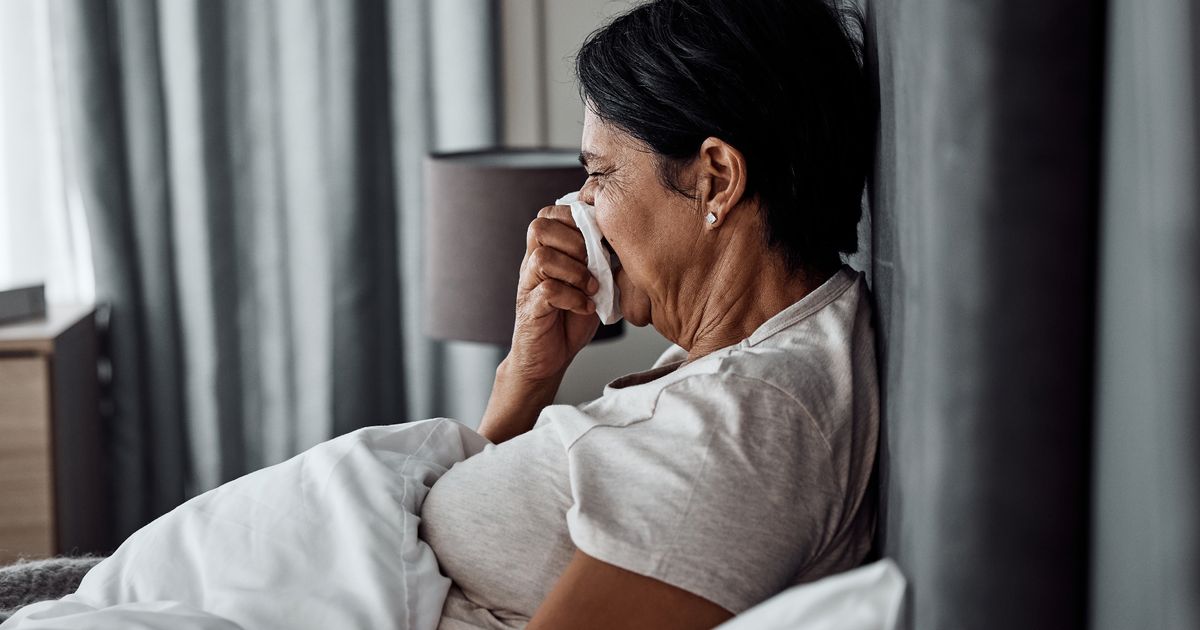Getting vaccinated remains important, health bosses said. Common symptoms of Covid can include a headache, sore throat and runny nose – but there are other more serious signs to watch out for(Image: Getty Images)
Common symptoms of Covid can include a headache, sore throat and runny nose – but there are other more serious signs to watch out for(Image: Getty Images)
After a September spike, Covid-19 cases across the UK may be slowing – but senior health figures remain concerned about the impact the new variants of the virus can cause. The latest data shows the illness can still cause severe risk to vulnerable people and cases have spiked in Newcastle, too.
According to UK Health Security Agency, cases of Covid appear to have seen a slight drop during October so far, but NHS leaders continue to warn people to get vaccinated where possible. This comes amid a fear that we are facing a severe and early flu season.
When it comes to Covid-19, the recently dominant variants are named Stratus and Nimbus. Earlier in the autumn, these variants drove uptick in Covid-19 cases and that is now feeding into a rise in Covid-19 hospitalisations. Nationwide, up to October 10, there were 141 deaths due to the virus in a week – up 41% on the previous week.
The Stratus variant has been coded XFG by experts and had accounted for 40% of new UK cases as long ago as June. Now, it or its closely related variants accounts for well over 80% of cases.
The UK Health Security Agency has now begun its more detailed reporting of winter illnesses, focussing on respiratory infections like flu and Covid-19. In its latest “surveillance report”, the agency said: “Influenza activity increased, particularly among children, and is now above baseline in some indicators. COVID-19 showed decreasing activity, circulating at low levels. Respiratory syncytial virus (RSV) showed increasing activity across some indicators but is still circulating at baseline levels “
In the North East, cases had steadily risen over recent weeks, but the trend may be turning. Across the region as a whole, cases are at 4.46 per 100,000 people on October 22. That’s stable, not much lower than the 7.07 seen a week ago – but that was clearly down on the more than 10 per 100,000 seen on October 6. However in the city of Newcastle itself, cases have jumped.
Health leaders in our region continue to encourage people to get life-saving vaccinations. Appointments for both flu and COVID-19 jabs can be booked through the NHS website, the NHS App, or by calling 119 free of charge. If eligible for both, people can receive their vaccines at the same time.
As of October 22, these are the seven-day rolling average Covid-19 case rates for our areas:
North Tyneside 6.69 cases per 100,000 people (9.08 a week ago)
Newcastle upon Tyne 11.40 cases per 100,000 people (10.39 a week ago)
Northumberland 7.15 cases per 100,000 people (9.95 a week ago)
Gateshead 2.55 cases per 100,000 people (4.59 a week ago)
South Tyneside 5.41 cases per 100,000 people (6.08 a week ago)
Sunderland 2.19 cases per 100,000 people (4.38 a week ago)
County Durham 1.15 cases per 100,000 people ( 6.52 a week ago)
Note that data for the most recent seven days is provisional and likely to rise – slightly – as further cases are reported to the health authorities.
Our ChronicleLive Daily newsletter is free. You can sign up to receive it here. It will keep you up to date with all the latest breaking news and top stories from the North East.
ChronicleLive has created a dedicated WhatsApp community for breaking news and our biggest stories. You can join this WhatsApp community here. It will keep you up-to-date with news as it breaks and our top stories of the day sent directly to your phone.

